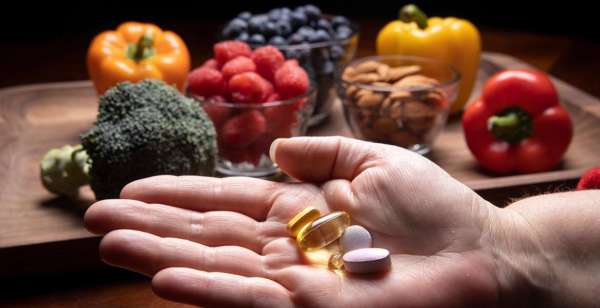
For decades, the “natural” health industry has been touting vitamin supplements by the thousands. Unfortunately, most of the supplements on the market are doing nothing more than creating expensive and perhaps even toxic urine. The truth is that most vitamins in supplements are made from or processed with petroleum derivatives or hydrogenated sugars, which makes them synthetic and pretty much worthless.
Even though they are often called natural, most non-food vitamins are isolated substances, which are crystalline in structure. Vitamins found naturally in food are not crystalline and are never isolated. Non-food vitamins are isolates, which means they are individual chemicals that lack the useful substances contained in real food.
Vitamins found in real food are chemically and structurally different from those commonly found in “natural vitamin” formulas. Food vitamins contain a matrix of substances which improve bioavailability and safety. Since they are different, people trying to be health conscious should consider non-food vitamins to be imitations and not actually vitamins. Whether sold retail or wholesale, nearly all companies sell synthetic vitamins.
The standards of naturopathy, set in 1947, state that “naturopathy does not make use of synthetic or inorganic vitamins. Naturopathy makes use of the healing properties of natural foods and organic vitamins”. Around the same time, the late Dr. Royal Lee, the father of holistic nutrition, wrote that it was not proper for ascorbic acid to be considered as vitamin C. Unfortunately, this is what most supplement companies use as vitamin C in their products.
According to some scientists, vitamins are organic substances that are essential in small amounts for the health, growth, reproduction and maintenance of animal species. These vitamins must be included in the diet since they cannot be synthesized at all or in sufficient quantity in the body. Each vitamin performs a specific function and this means that one cannot replace another. Vitamins originate primarily in plants. Isolated non-food vitamins, which are frequently called “natural”, USP or pharmaceutical grade, are not naturally included in the diet, frequently do not originate in plants and cannot fully replace all natural vitamin activities and requirements.
As stated previously, most vitamins in supplements are petroleum extracts, coal tar derivatives and / or chemically process sugars with other acids and industrial chemicals, such as formaldehyde, used to process them. Synthetic vitamins were originally developed because they cost less, not because they were beneficial. Assuming the non-food product does not contain fish oils, most synthetic petroleum-derived supplements will be labeled as “vegetarian”. This is not because they are from plants, but because they are not from animals.
To know the truth, you have to read the label of any supplement. If even one USP vitamin is listed, then the entire product is probably not food and you don’t want to buy it.
While many practitioners have been taught that food and non-food vitamins have the same chemical composition, this is completely false for most vitamins. The chemical forms of food and synthetic nutrients are quite different. There is no mandated definition of the term “natural” when it comes to vitamins, so seeing that term on a label is just deceptive marketing.
Because they are not normally in the same chemical form as vitamins found in food, non-food vitamins should be considered by natural health professionals as artificial imitations and not true vitamins for human consumption. Artificial vitamins are nothing more than cheap imitations of the vitamins found in food substances.
Although many mainstream health professionals believe that the body cannot tell whether a vitamin in the bloodstream came from an organically grown cantaloupe or from a chemist’s laboratory, this belief is quite misleading for several reasons.
1. It assumes that the process of getting the amount of the vitamin into the bloodstream is the same, which is frequently not the case.
2. Particle size is an important factor in nutrient absorption, even though particle size is not detected by chemical assessment.
3. It is known that the food factors that influence the absorption of nutrients relates not only to the nature of the nutrients themselves, but also to their interaction with each other and with the nonabsorbable components in food.
4. The physiochemical form of a nutrient is a major factor in bioavailability.
5. Most non-food vitamins are crystalline in structure.
Published scientific research has concluded that natural vitamins are nutritionally superior to synthetic ones. For example, the vitamin C produced by acerola is better absorbed by the human body than synthetic ascorbic acid. Food vitamins in the physiochemical forms that the body recognizes are generally not crystalline in structure, contain food factors that affect bioavailability and appear to have smaller particle sizes.
When it comes to supplementation, whole foods are always the better choice and for optimal health, you want to get your vitamins and minerals from organic, locally grown foods. But if you do need to supplement from a source other than whole foods, take the time to find a quality supplement. It can make all the difference in the world to your overall health and well being.

